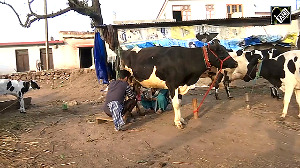Noticing irregularities in coking coal purchases, the Steel Ministry has set up a committee to look into the rationale behind PSUs buying more of the commodity when it is expensive, and less of it when cheaper. Almost convinced that there is something "wrong" in the pattern, an irked Steel Minister Beni Prasad Verma suspects, "Hai Kuchh Raaj Isme (there is something to it)".
Almost convinced that there is something "wrong" in the pattern, an irked Steel Minister Beni Prasad Verma suspects, "Hai Kuchh Raaj Isme (there is something to it)".
"We have noticed few aberrations in coking coal purchase. When rates of coking coal are high (in the international market), the purchases increase and when the prices go down, purchases also go down. That's why we have constituted this committee to find out why this happens. Is this a deliberate act or what?" Verma said.
He said the committee, constituted to scrutinise the coking coal procurements by the firms under jurisdiction of the steel ministry like SAIL and RINL, headed by an Additional Secretary, would submit its report by December.
Interestingly, top executives of SAIL, NMDC and
Verma did not divulge any detail on the purchases made by various PSUs from time to time.
The committee has also been mandated to look into what kind of technology should be used to increase usage of thermal coal to reduce dependence on imported coking coal.
Coking coal prices were up last fiscal on account of short-supply from the Queensland province of Australia, the world's largest exporter in both coking coal and iron ore.
The costlier coking coal hurt the profitability of steel companies in India. SAIL's profitability was affected by 29 per cent in the Q1 this fiscal, Verma said, adding that the PSU was expected to bridge the gap in second quarter.
SAIL requires around 15 million tonnes of coking coal a year. Only 4.5 million tonnes is met through domestic sources and the remaining 10.5 million comes from imports, around 60 per cent of which comes from Australia.
"Rates of coking coal have increased but steel prices have not risen," Verma said.









 © 2025
© 2025